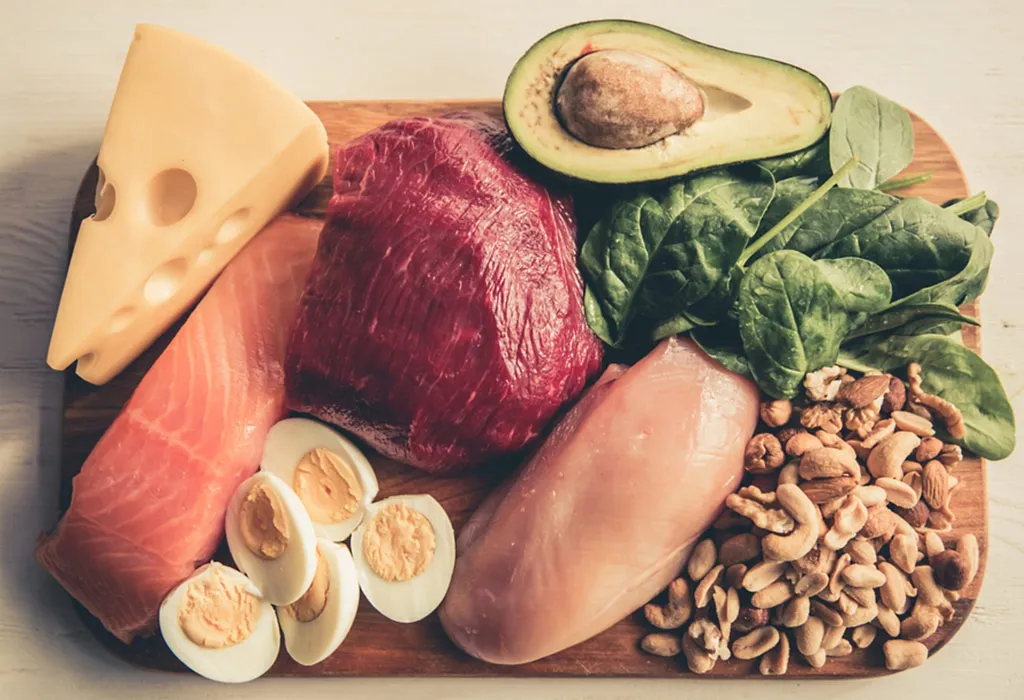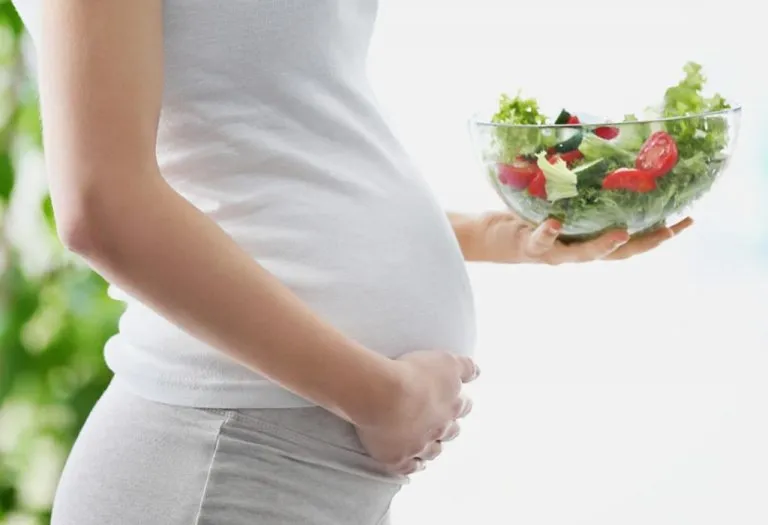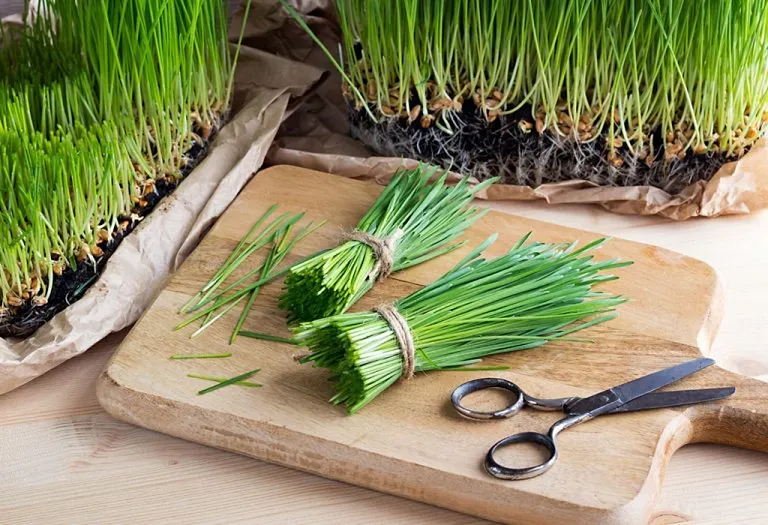Sixth Month of Pregnancy Diet (21-24 Weeks)

- Foods to Include in a 6-Month Pregnancy Diet
- Foods to Avoid During the Sixth Month of Pregnancy
- Supplements That You Can Take During the 6th Month of Pregnancy
- Diet Tips for a 6 Months Pregnant Woman
- FAQs
As you journey into the 6th month of pregnancy, a notable shift occurs as your growing baby establishes a more defined pattern of activity and rest within the womb. Simultaneously, your body continues to undergo a series of changes, bringing forth a myriad of symptoms. You may find yourself grappling with swelling in your hands and feet, grappling with lower back pain, experiencing gastrointestinal discomfort, noticing an increase in vaginal discharge, and perhaps even encountering bleeding gums. These bodily transformations are typical during this stage of pregnancy, reflecting the intricate process of your baby’s development and your body’s adaptation to accommodate it. We’ll now take a look at what a 6th month pregnancy diet plan looks like.
Foods to Include in a 6-Month Pregnancy Diet
You will have begun experiencing hunger like you haven’t felt before – both frequently and intensely. Here is a list of what to eat in the 6th month of pregnancy.
1. Vitamin C
Due to the high volume of blood in your body at this stage of pregnancy, you may begin experiencing bleeding gums. If the condition worsens, it could lead to gingivitis. Consume a high amount of vitamin C during this month as it is essential for repairing and maintaining connective tissue all over the body, including tissue that binds teeth to the gums and the jaw bone.
Citrus fruits such as oranges, lemons, and tangerines are rich in vitamin C. Other sources of vitamin C are strawberries, grapes, cabbage, and sweet potato.
2. Vegetables
The further your pregnancy progresses, the more you will be vulnerable to constipation and indigestion. Studies suggest that most women will have haemorrhoids during the course of their pregnancy. Fibre found in vegetables is an essential part of the 6-month pregnancy food chart as it provides roughage which aids regular, healthy bowel movements. Along with good amounts of fibre, vegetables are rich in various types of vitamins and minerals.
3. Fluids
Remember that as a pregnant lady, you are not just eating for two but also drinking for two. Staying hydrated means consuming a minimum of 8 glasses of water a day. In addition to that, you should get some smoothies and juices into the mix for your overall wellness. Staying hydrated is important in the list of food for a 6-month pregnant woman. Fighting constipation is essential, so drink up!
4. Folic Acid
Folic acid is a complex vitamin which is necessary for the building of new cells. It is especially important to incorporate sources of folic acid into the list of foods to eat during the second trimester as your foetus’ brain undergoes rapid development towards the end of 24 weeks.
Foods rich in folic acid are whole-grain bread and cereals, green vegetables (broccoli, spinach and lettuce), flax seeds, sunflower seeds, pumpkin and sesame seeds, peanuts, and almonds. It is also found in certain fruits and vegetables such as okra, peas, grapes, and bananas.
5. Protein
Considering that it is the building block of cells, protein is always welcome. Unlike carbohydrates, proteins do not readily convert into fats to be stored for later use.
Foods rich in protein are dairy products, eggs, and lean, white meat. Other sources of protein that are popular in Indian cuisine are legumes and pulses.

6. Carbohydrates
Like proteins, carbohydrates are an essential nutrient for day-to-day activities. Carbohydrates are burnt by the body for energy. Excess carbohydrates are converted to fat and stored in cells.
Refined carbohydrates like polished rice (without the husk) and white bread quickly break down into sugars, leading to spikes in the blood glucose level. Thus, it is wise to stick to whole-grain bread and brown rice. Wheat, oatmeal, and cereals are also good sources of carbohydrates.
7. Fruits
Fruits provide a variety of vitamins, minerals, and essential roughage to aid digestion. Also, since water is a major constituent of most fruits, it helps you stay hydrated.
Consuming a large variety of fruits can help ensure you are getting all the micronutrients you require. For example, Pears contain phosphate, vitamin C, potassium, and copper; Apples contain antioxidants, B-complex, iron, and phytonutrients; Bananas contain potassium, vitamin B-6 and vitamin C, etc.
8. Iron
Iron is crucial during pregnancy to support the increased production of blood to supply oxygen to both you and your growing baby. Insufficient iron intake can lead to anemia, causing fatigue and weakness. Incorporate iron-rich foods into your diet, such as lean meats, poultry, fish, beans, lentils, tofu, fortified cereals, and dark leafy greens like spinach and kale.
9. Omega-3 Fatty Acids
Omega-3 fatty acids play a vital role in fetal brain and eye development. Include sources of omega-3s such as fatty fish like salmon, mackerel, and trout, as well as flaxseeds, chia seeds, walnuts, and soybeans in your diet to promote healthy neurological development in your baby.
Foods to Avoid During the Sixth Month of Pregnancy
According to the American Pregnancy Association, some foods can adversely affect you and your baby if consumed during the 6th month of your pregnancy (1). Here is the list:
1. Seafood
A lot of pregnant women may want to consume raw seafood items such as sushi, but it may not be the best idea. Most seafood contains trace amounts of mercury, as compounds containing mercury (methylmercury) do not decompose easily in saltwater but are broken down by the action of vegetative matter in freshwater. While adult bodies may not be affected adversely by small amounts of mercury, it is best to avoid contact during pregnancy as your baby’s brain is still in its early stages of development.
2. Caffeine
High caffeine intake has been linked to restlessness and sleeplessness in newborns. Caffeine intake by the mother will increase the foetus’ heart rate and increase its chance of developing a dependency. Also, since a foetus has no developed system to detoxify, the caffeine stays in its system for longer than it may in a grown up’s.
3. Soy
Phytoestrogens are compounds found in soy and certain herbs used to boost fertility. Phytoestrogens take on the role of natural estrogen and bind with estrogen receptors. This makes it a useful addition for women attempting to conceive. However, if you are already pregnant, these false hormones can adversely affect the development of your baby’s brain, sexual organs, and immune system.
4. Fast Food
Lots of pregnant women crave greasy fast food during pregnancy. Most people, regardless of whether they are pregnant or not, get sudden cravings for fast food! The high amount of calories in fast food can cause your blood glucose levels to spike and drop fast. These extremes can cause irritability, tiredness, and in the long run, impairment of vital organs.

Fast food can contribute to gestational diabetes, which is a condition where pregnant women develop high blood sugar. If left unchecked, this could lead to permanent health issues in the foetus.
5. Undercooked Meat
Always make sure that, when eating chicken or other meats, you are consuming only well-cooked food. If undercooked, bacteria called Listeria bacterium (found in meat) could be transferred into your body, causing Listeriosis. Listeriosis is food poisoning that can result from eating contaminated vegetables, undercooked meat, and unpasteurised dairy products (2). In pregnant women, it can lead to miscarriage.
6. Spicy Food
Spicy foods are not unsafe for your growing baby. However, during the later stages of pregnancy, it can cause heartburn, indigestion, and general discomfort, so it is best avoided during the latter stages of pregnancy.
7. Alcohol and Tobacco
It is well known that tobacco and alcohol need to be completely avoided during pregnancy (3). Avoiding these drugs is recommended even when trying to conceive! These drugs can severely affect the development of your foetus.
8. Raw Eggs
Raw eggs are a complete no-no for pregnant women. Raw eggs contain salmonella bacteria that can cause problems for you and the foetus. Thus, make sure your eggs are cooked through before you consume them.
9. Soft Cheeses
Soft cheeses such as brie and camembert should also be avoided as they can cause listeria infection, which can be fatal to both the mother and the baby.
Supplements That You Can Take During the 6th Month of Pregnancy
During the sixth month of pregnancy, supplements can play a crucial role in ensuring that both you and your baby receive essential nutrients for optimal health and development. While a balanced diet is important, certain supplements can help fill any nutritional gaps and support specific needs during this stage of pregnancy.
1. Prenatal Vitamins
Prenatal vitamins are specially formulated to provide additional vitamins and minerals necessary for a healthy pregnancy. They typically contain folic acid, iron, calcium, and other essential nutrients vital for fetal development and maternal well-being.
2. Iron
Iron supplementation may be recommended to prevent or treat iron deficiency anemia, which is common during pregnancy due to the increased demand for iron by both the mother and the developing baby. Iron helps in the production of hemoglobin, which carries oxygen to the cells in your body and to your baby.
3. Vitamin D
Vitamin D is essential for calcium absorption and bone health, both for the mother and the baby. During the sixth month of pregnancy, supplementing with vitamin D can help ensure adequate levels, especially if sun exposure is limited or if you have certain risk factors for deficiency.
4. Omega-3 Fatty Acids
Omega-3 fatty acids, particularly DHA (docosahexaenoic acid), are crucial for fetal brain and eye development. While you can obtain omega-3s from foods like fatty fish and flaxseeds, supplementation may be recommended to ensure sufficient intake, particularly if your diet is lacking in these nutrients.
5. Calcium
Calcium is necessary for the development of your baby’s bones and teeth, as well as for maintaining your own bone health. Supplementing with calcium can help meet the increased demand during pregnancy, especially if dietary intake is insufficient. Look for calcium supplements that also contain vitamin D for better absorption.
Diet Tips for a 6 Months Pregnant Woman
- Avoid taking any over-the-counter medication.
- If you take any regular medication, it is of utmost importance that you consult your doctor on their use during pregnancy.
- Cravings are a natural part of pregnancy! Create a habit of indulging in healthy cravings like fruit and vegetables.
- Craving greasy fast food is normal during pregnancy and otherwise. Only indulge these cravings once or twice a week and try to keep it to small portions.
- When it comes to food during 6th month of pregnancy, after finishing a small portion of fast food or other kinds of heavy food, do not refill your plate immediately. Sitting down and waiting for a few minutes can curb your desire to get a refill as it takes some time for your stomach to signal to your brain that it is full and doesn’t need refreshment.
- Make sure you take all your supplements as they can play a huge role in your hunger patterns.
FAQs
1. Are there any foods I should avoid during this stage of pregnancy?
While many foods are safe to consume during pregnancy, it’s essential to avoid certain foods that may pose a risk of foodborne illness, such as unpasteurized dairy products, raw seafood, and undercooked meats. Additionally, limit your intake of caffeine and avoid alcohol entirely.
2. How can I manage common digestive issues like constipation and indigestion during the sixth month of pregnancy?
In terms of 6th month pregnancy food, increasing your intake of fiber-rich foods, staying hydrated, and eating smaller, more frequent meals can help alleviate constipation and indigestion. Additionally, avoiding spicy and greasy foods may help reduce discomfort.
3. Is it safe to consume fish during pregnancy?
Yes, certain types of fish are safe to eat during pregnancy and are a valuable source of protein and omega-3 fatty acids. However, it’s essential to choose low-mercury options such as salmon, trout, and sardines and limit consumption of high-mercury fish like shark, swordfish, and king mackerel.
This was all about what to eat in the sixth month of pregnancy. A balanced diet leads to a healthy mommy, and a healthy mommy creates a healthy baby! We hope the 6th month pregnancy diet chart given above helps you during this journey!
References/Resources:
1. Foods to Avoid During Pregnancy; American Pregnancy Association; https://americanpregnancy.org/healthy-pregnancy/pregnancy-health-wellness/foods-to-avoid-during-pregnancy/
2. People at Risk: Pregnant Women; FoodSafety.gov; https://www.foodsafety.gov/people-at-risk/pregnant-women
3. Centers for Disease Control and Prevention; https://www.cdc.gov/tobacco/basic_information/health_effects/pregnancy/index.htm
4. Pregnancy Nutrition; American Pregnancy Association; https://americanpregnancy.org/healthy-pregnancy/pregnancy-health-wellness/pregnancy-nutrition/
5. Nutrition During Pregnancy; Johns Hopkins Medicine; https://www.hopkinsmedicine.org/health/wellness-and-prevention/nutrition-during-pregnancy
6. Healthy Weight during Pregnancy; EatRight.org; https://www.eatright.org/health/pregnancy/prenatal-nutrition/healthy-weight-during-pregnancy
7. Vegetarian or vegan and pregnant; NHS; https://www.nhs.uk/pregnancy/keeping-well/vegetarian-or-vegan-and-pregnant/
Also Read:
Four Month Pregnancy Diet
5th Month of Pregnancy Diet
Pregnancy Diet for Seven Month
Was This Article Helpful?
Parenting is a huge responsibility, for you as a caregiver, but also for us as a parenting content platform. We understand that and take our responsibility of creating credible content seriously. FirstCry Parenting articles are written and published only after extensive research using factually sound references to deliver quality content that is accurate, validated by experts, and completely reliable. To understand how we go about creating content that is credible, read our editorial policy here.




































